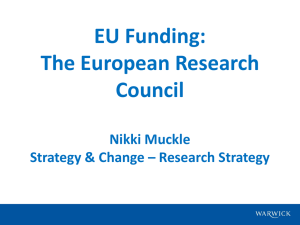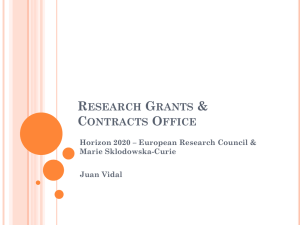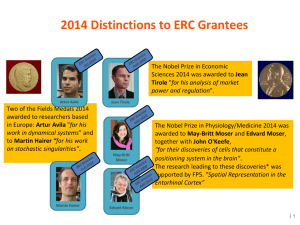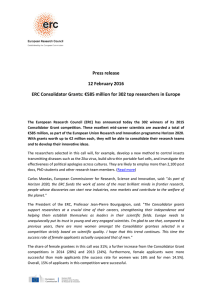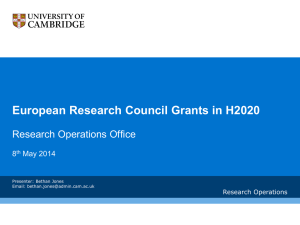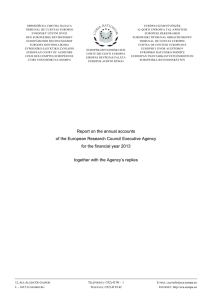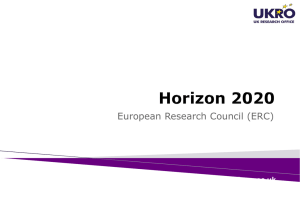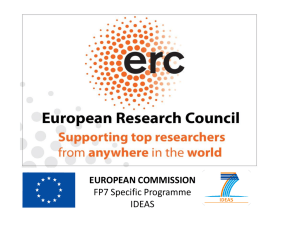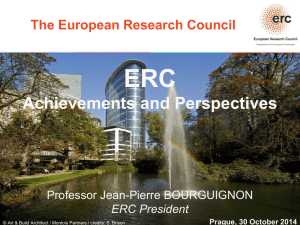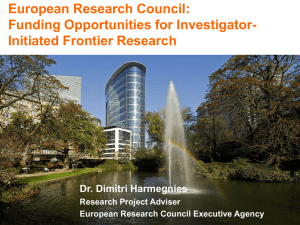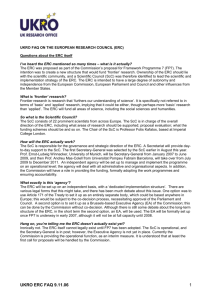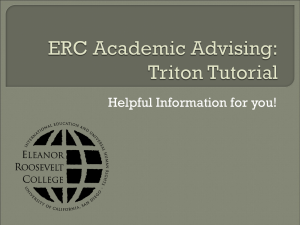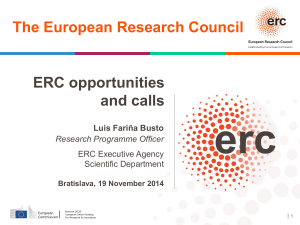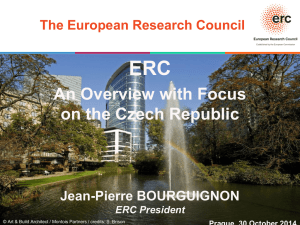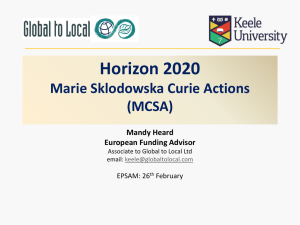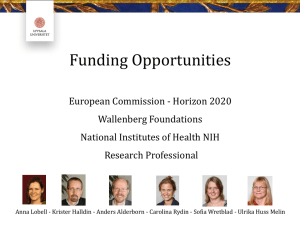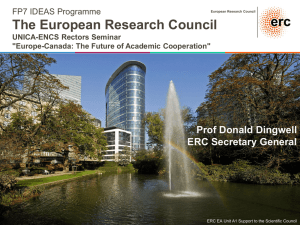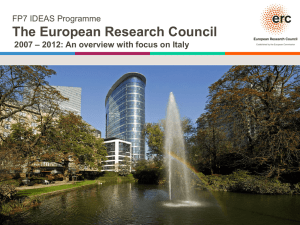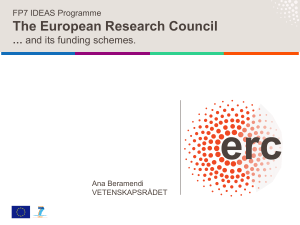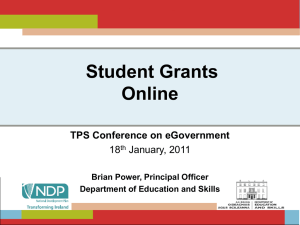Horizon 2020 presentation to School of Arts
advertisement
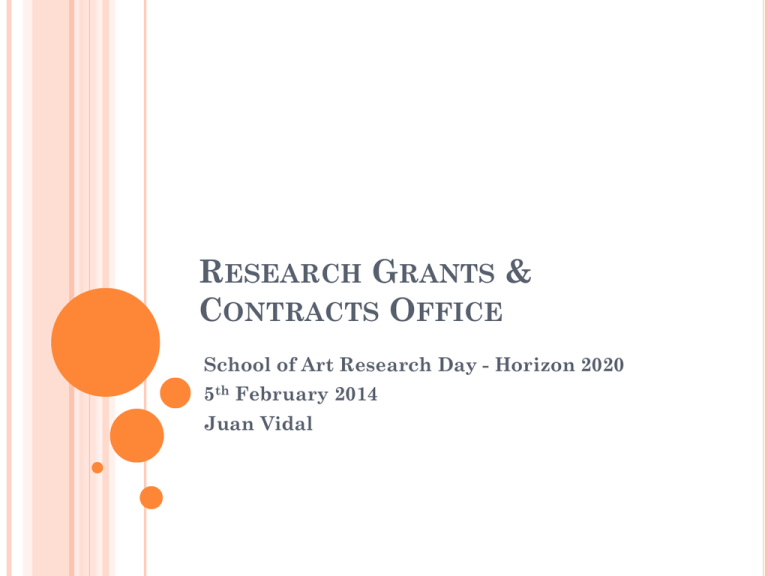
RESEARCH GRANTS & CONTRACTS OFFICE School of Art Research Day - Horizon 2020 5th February 2014 Juan Vidal SUMMARY Research Grants and Contracts Office Overview of Horizon 2020 European Research Council Marie Sklodowska-Curie Societal Challenges Opportunities for Social Sciences and Humanities in Horizon 2020 Where to find more information on Horizon 2020 And finally... some non-research EU funding schemes that you might want to consider RESEARCH GRANTS AND CONTRACTS OFFICE Research Grants and Contracts Office: Provides information on funding Assists in the preparation of applications Advises on contracts Undertakes project accounting and financial reporting Provides management information for research Promotes research within the College Provides financial and contractual administration of consultancy projects WHO TO CONTACT IN RESEARCH GRANTS AND CONTRACTS OFFICE Applications Accounting School of Art’s nonEU research grants George Eyre Rassi Pelpola School of Art’s EU research grants Juan Vidal Marion Barthram Consultancy Claire Bensusan Marion Barthram OVERVIEW OF HORIZON 2020 WHAT IS HORIZON 2020 The European Union’s funding instrument for research and innovation from 2014-2020 Budget of €70.2 billion From research to innovation – from basic research to bringing ideas to the market Focus on societal challenges that the EU member states are facing (e.g. health, clean energy, food security, integrated transport) HORIZON 2020 STRUCTURE Excellent Science European Research Council (ERC) Future and Emerging Technologies (FET) Industrial Leadership Societal Challenges Health and Wellbeing Leadership in Enabling and Industrial Technologies (LEIT) ICT, KETs, Space Marie SkłodowskaCurie Actions (MSCA) Research Infrastructures Food security Transport Energy Climate action Access to Risk Finance Societies Innovation in SMEs Security Widening Participation; Science with and for Society EXCELLENT SCIENCE Total budget €21.6 billion Overall objective: “to strengthen the excellence of European research” Mostly operates on a “bottom-up” basis Four funding programmes European Research Council Future Emerging Technology Funds collaborative frontier research Marie Sklodowska-Curie Research Infrastructures Funding mechanism for Europe-wide infrastructures to support research INDUSTRIAL LEADERSHIP Main programme under this pillar funds collaborative top-down research Leadership in Enabling and Industrial Technologies (LEIT) Risk Financing Innovation to SME’s Focused on applied research and innovation activities SOCIETAL CHALLENGES Challenge Objectives Health Improve lifelong health and wellbeing Food security Secure sufficient supplies of safe and high quality food and other bio-based products Energy Transition to a reliable, sustainable and competitive energy system Transport Resource-efficient, environmentally friendly, safe, seamless, and performing transport system for the benefit of all citizens, the economy and society. Climate and resources Resource efficient and climate change resilient economy and a sustainable supply of raw materials Societies Foster inclusive, innovative and secure European societies EUROPEAN RESEARCH COUNCIL ERC FUNDING SCHEMES 1 Starting Grants Consolidator Grants Advanced Grants Synergy Grants Proof of Concept Grants ERC FUNDING SCHEMES 2 Summary of Main Grant Schemes Starting Grant Consolidator Grant Advanced Grant Deadline 2014 25 March 20 May 21 October Budget 2014 (No. grants awarded) €485 million (370) €713 million (400) €450 million (200) Deadline 2015 3 February 12 March 2 June Budget 2015 (No. grants awarded) €411 million (315) €603 million (340) €640 million (285) Max Size of grant €1.5 million + €0.5 million start-up €2.0 million + €0.75 million start-up €2.5 million + €1.0 million start-up ERC FUNDING SCHEMES 3 Three research domains Indicative split between the domains Physical Science & Engineering 44% Life Sciences 39% Social Sciences & Humanities 17% SH1 Markets, Individuals and Institutions - Economics, finance and management SH2 The Social World, Diversity and Common Ground – Sociology, social anthropology, political science, law, communication, science and technology studies. SH 3 Environment, Space and Population – Sustainability science, demography, geography, regional studies and planning ERC FUNDING SCHEMES 4 SH4 The Human Mind and its Complexity – Cognitive science, psychology, linguistics, philosophy of mind, education SH5 Cultures and Cultural Production – Literature, philology, cultural studies, arts, philosophy SH 6 The Study of Human Past – Archaeology and histroy Open to any nationality Funding for best “frontier research” – research excellence the only criteria Lead by a single PI, supported by a research team ERC ELIGIBILITY CRITERIA 1 Starting Grant Specific eligibility criteria: Principal Investigator shall have been awarded his/her first PhD ≥ 2 and ≤ 7 years prior to the publication date of the call for proposals of the ERC Starting Grant (for 2014 the publication date is 11th December 2013) ERC ELIGIBILITY CRITERIA 2 Consolidator Grant Specific eligibility criteria: Principal Investigator shall have been awarded his/her first PhD > 7 and ≤ 12 years prior to the publication date of the call for proposals of the ERC Consolidator Grant (for 2014 the publication date is 11th December 2013) ERC ELIGIBILITY CRITERIA 3 Advanced Grant No specific eligibility criteria instead look at 10 year track record. Benchmark (meet at least one of the criteria) 10 publications as senior author in major international peer-reviewed journals/peer-reviewed conference proceedings 3 major monographs, of which one is translated into another language Plus – 10 invited presentations at major conferences or advanced schools; organised 3 well-establish conferences/congresses; major artistic prizes/awards; membership of Academies; ERC BUDGETS 1 Eligible costs: Principal Investigator’s salary costs Cost of senior “researchers” at the College or at other institutions Post-doctoral researchers and other research staff (such as technicians) PhD student stipends Direct costs such as equipment, consumables, travel and subsistence, payments to participants, field work costs, and open access publication charges ERC BUDGETS 2 Will fund 100% of direct costs + 25% indirect costs, except for sub-contracts (typically audit fees) which are only funded at 100% of direct costs i.e. PI 50,000 PDRA 250,000 Equipment 700,000 Sub-contract (Audit Fees) 5,000 Sub-total 1,005,000 Indirect 250,000 TOTAL ERC Contribution 1,255,000 HOW TO PREPARE AN ERC BID 1 Proposals are submitted via the Research and Innovation Participants Portal http://ec.europa.eu/research/participants/portal/de sktop/en/ Same portal is used to identify opportunities, and manage awarded grants The bid consists of two main sections – Part A and the Part B. The Part A will consist of a title page with summary, contact information for the PI and the College, and a summary budget HOW TO PREPARE AN ERC BID 2 Part B split into multiple sections Cover page Includes 2000 word summary & if cross-disciplinary, 1000 word justification of the cross-disciplinary nature Part B1 consists of: Extended synopsis: 5 pages – show how proposed research is ground breaking CV: 2 pages Funding ID: - list of on-going grants & grant applications Achievement track record: 2 pages HOW TO PREPARE AN ERC BID 3 Part B2 Detailed scientific proposal: 15 pages State of the art objectives Methodology Resources required (including breakdown & justification of costs) Template for starting grant available at: http://ec.europa.eu/research/participants/data/ref/ h2020/call_ptef/pt/h2020-call-pt-erc-stg_en.pdf Template for consolidator grants available at: http://ec.europa.eu/research/participants/data/ref/h2020/ call_ptef/pt/h2020-call-pt-erc-cog_en.pdf EVALUATION Two-stage evaluation Stage 1 evaluate the extended synopsis and CV Stage 2 evaluate the full proposal Evaluate both research & PI Ground breaking nature research Scientific approach Intellectual capacity and creativity Commitment to spending at least 50% on the project and at least 50% in EU Member state or Associated Country MARIE SKLODOWSKA-CURIE SCHEMES UNDER MARIE SKLODOWSKACURIE Research and Staff Exchange (RISE) Individual Fellowships (IF) Innovative Training Networks (ITN) Co-funding of regional, national and international programmes (COFUND) Deadlines • RISE 24th April • ITN 9th April • IF will be published 12th March for 11th September deadline SUMMARY OF RISE Funds two-way exchanges of staff between academic and non-academic institutions Promotes knowledge exchange, networking and workshops Total budget of €70 million Flat rate funding Top funding for personnel €2,000/person month Institution gets €1,000/person month for research, training and network costs, and €700/person month for management & indirect costs 30 page proposal – no details available yet on format of proposal INDIVIDUAL FELLOWSHIPS 1 About the career development of “experienced” researchers (defined as 5+ years research experience from their degree) Two types of fellowship: European Fellowships – held in EU Member state or associate county, 12 – 24 months in duration Global Fellowships – secondment to third country of 12 – 24 months with mandatory 12 month return to EU Member state INDIVIDUAL FELLOWSHIPS €240.5 million for 2014, of which €29 million for global fellowships Flat rate budget Monthly living allowance Monthly Mobility Allowance Monthly Family Allowance €4,650* €600 €500 * Adjusted by country coefficient, so will get €5,593.95/month in UK Research, Training and Network Costs Management and Indirect costs €800 €650 FORMAT OF IF Part A General information about the proposal Data on participating organisations Budget (in terms of requested researcher months) Ethics table Information on partner organisations Part B CV of the Experienced researcher Description of the research infrastructure/capacity of the organisation Description of any research partners Max 10 pages excluding CV & annexes EVALUATION OF IF INNOVATIVE TRAINING NETWORKS Three types of ITN: European Training Networks (ETN) European Industrial Networks (EIN) European Joint Doctorates (EJD) Total budget for this call €405.18 million, with €25.5 million allocated to EIN and €30 million allocated to EJD All ITN require the mobility of the Early Career Researchers Projects run for 48 months, and Early Career Researchers are recruited for between 3 and 36 months ETN ETN: Minimum of 3 beneficiaries in at least 3 different EU Member States or Associated Countries Typically 6 – 10 participants, must involve nonacademic participants May apply for maximum of 540 researcher months per network Researchers will typically be enrolled on a PhD EIN EIN: Minimum of 2 participants, 1 academic and 1 nonacademic, located in different EU Member States or Associated Countries Maximum of 540 researcher months for Networks with more than two participants, otherwise maximum 180 researcher months Researchers must spend 50% of their time at the nonacademic participant, plus up to 30% at other beneficiaries Must be enrolled for a PhD EJD EJD: Minimum of 3 academic participants from 3 different EU Member States or Associated Countries. Above this minimum may include participants from any sector May apply for maximum of 540 researcher months per network As a minimum researchers must be enrolled for a Joint Doctorate The network must provide Joint/Double or Multiple Doctoral Degrees BUDGET UNDER ITN Flat rate budget Monthly living allowance Monthly Mobility Allowance Monthly Family Allowance €3,110* €600 €500 * Adjusted by country coefficient, so will get €3,741.33/month in UK Research, Training and Network Costs Management and Indirect costs €1,800 €1,200 FORMAT OF ITN 1 Part A General information about the proposal Data on participating organisations Budget (in terms of requested researcher months) Ethics table Information on partner organisations FORMAT OF ITN 2 Part B List of Participants 1. Summary 2. Excellence 3. Impact 4. Implementation Gantt chart 5. Capabilities of the participating organisations 6. Ethical aspects Letters of commitment http://ec.europa.eu/research/participants/portal/d oc/call/h2020/h2020-msca-itn-2014/1590152itn_2014_-_guide_for_applicants_1.2_en.pdf EVALUATION OF ITN SOCIETAL CHALLENGES Collaborative projects requiring consortia, typically require at least 3 organisations from three different EU member states or Associated Countries University funded at 100% of direct costs + 25% indirect costs (except for sub-contracts) SELECTED CALLS UNDER SOCIETAL CHALLENGES Reflective Societies: Cultural Heritage and European Identities Innovative ecosystems of digital cultural assets 21/4/14 Social platform on reflective societies 3/6/14 Emergence and transmission of European cultural heritage and Europenisation 1/7/14 European cohesion, regional and urban policies and the perceptions of Europe 1/7/14 Cultural heritage of war in contemporary Europe 1/7/14 Cultural opposition in the former socialist countries 1/7/14 Advanced 3D modelling for accessing and understanding European cultural assets 30/9/14 OPPORTUNITIES FOR SOCIAL SCIENCES AND HUMANITIES IN HORIZON 2020 Some concern that there are less opportunities for social sciences and humanities that under FP7 Net4society – a network of National Contact Points for Socio-Economic Sciences and the Humanities have prepared advice on social sciences and humanities in Horizon 2020: http://www.net4society.eu/ http://www.net4society.eu/_media/NET4SOCIETY_O pportunities_SSHresearchers_2014_2015_final.pdf WHERE TO FIND MORE INFORMATION UKRO web-site: http://www.ukro.ac.uk/Pages/UKRO.aspx UKRO subscriber services (regular e-mails on which EU funding call have been published and UKRO training sessions for ERC/Marie Sklodowska-Curie events) RGCO web-site: http://www.bbk.ac.uk/rgco/otherservices/events.s html Funding Opportunities section of the Research & Innovation Participants Portal: http://ec.europa.eu/research/participants/portal/d esktop/en/opportunities/index.html OTHER SCHEMES TO CONSIDER These schemes are not supported by RGCO as they are primarily for teaching and learning: Erasmus+ - fund visits/teaching activities at partner institutions in EU: http://www.erasmusplus.org.uk/, http://ec.europa.eu/programmes/erasmus-plus/ Jean Monet – fund various programmes to support European Union studies: http://ec.europa.eu/education/opportunities/jeanmonnet/teaching-research_en.htm Culture programme – new programme expected to be agreed in 2014
